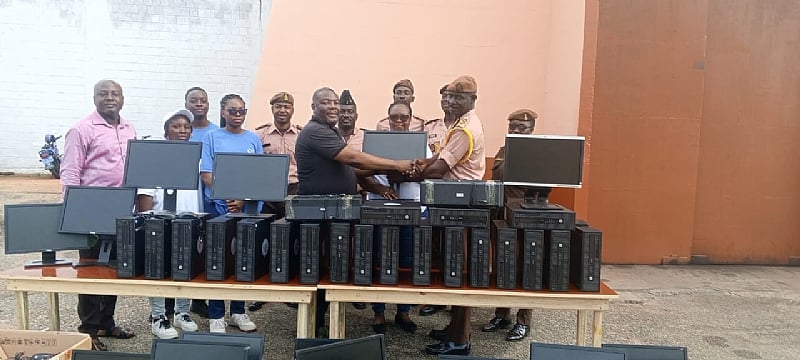In a commendable initiative aimed at uplifting the underprivileged, the Ajet-Nasam family has donated 20 desktop computers to the Nsawam Medium Security Prison in the Eastern Region. This generous gesture targets enhancing Information and Communication Technology (ICT) education for both prison officers and inmates. The donation is a continuation of the family’s commitment to fostering educational opportunities within the prison, echoing their previous support when they provided educational materials, including books, to aid the prison’s educational efforts. Mr. John Ajet-Nasam, during the presentation of the computers, emphasized the transformative power of such contributions, stating that they empower both inmates and officers to acquire essential computer skills vital for personal development and rehabilitation.
Mr. Ajet-Nasam articulated that their motivation stems from their Christian faith, indicating that this act of generosity is a manifestation of their love for humanity and the guiding grace they believe has led them through life’s challenges. He underscored a broader philosophy that life’s true beauty lies not merely in individual happiness but in the happiness one can bring to others. This perspective is significant as it highlights the Ajet-Nasam family’s vision of not only offering support but also actively participating in the social upliftment of individuals often marginalized by society due to their circumstances. Mr. Ajet-Nasam’s comments reflect a deep commitment to social responsibility and the belief that education is a critical avenue through which transformative change can occur.
The impact of the donation was acknowledged by Assistant Director of Prisons, Patrick Thomas Seidu, who received the computers on behalf of the Ghana Prison Service. Seidu expressed profound gratitude for the support, emphasizing the positive implications the computers would have on the prison’s educational programs. He highlighted that these tools will facilitate inmates and officers in acquiring vital ICT skills, key to their rehabilitation and eventual reintegration into society. The Ajet-Nasam family’s contributions thus resonate with the overarching goal of reform within the penal system—the belief that education and skill acquisition are essential components of successful rehabilitation and societal reintegration.
Superintendent Paul Nuobepour, the officer in charge of education at Nsawam Medium Security Prison, elaborated on the impressive progress within the prison’s educational programs, especially at the tertiary level. With an enrollment of 181 inmates in programs under the University of Cape Coast (UCC), the prison showcases its dedication to providing higher education despite the challenging environment. The completion of studies by the first batch of tertiary students—with many awaiting graduation and a significant number poised to earn first-class honors—highlights the potential for transformative educational experiences in this setting. The flourishing educational landscape in the prison underscores the significance of institutional support and educational resources further enhanced by the latest computer donation.
Currently, the prison’s ICT unit plays a crucial role in providing inmates with valuable computer proficiency training in software, hardware, and Microsoft applications. As of now, 81 inmates are in training, underscoring the institution’s commitment to fostering practical skills that facilitate a smoother transition back into society upon release. In addition to the tertiary and ICT programs, Nsawam Medium Security Prison also runs a recognized senior high school and a basic school, with around 70 inmates enrolled in the latter tier. Superintendent Nuobepour’s insights accentuate the institution’s relentless pursuit of educational excellence, illustrating how an integrated educational framework can empower inmates, reducing recidivism risks.
However, Superintendent Nuobepour also called attention to the pressing need for increased stakeholder support to expand these educational initiatives further. He highlighted that while the senior high school has garnered recognition from the Ghana Education Service as a reformed institution, there is a significant opportunity to develop it further by allowing civilian students to attend classes alongside inmates. This integration could foster mutual understanding and reduce stigma associated with incarceration. Additionally, he pointed to recent recommendations from the Ghana Tertiary Education Commission (GTEC) regarding upgrades to the prison library to meet university standards, alluding to ongoing efforts to enhance the educational infrastructure.
Despite the notable achievements and progress made, challenges persist. Superintendent Nuobepour noted a need for additional educational materials, particularly exercise books, stating that while over 900 books have been provided, further resources are requisite to meet the growing demand. He called for continued support from various stakeholders, urging them to contribute to the prison’s educational programs to effectuate meaningful impact on inmates’ lives. By securing the necessary resources and support, Nsawam Medium Security Prison can continue to foster an environment where education and rehabilitation work hand in hand, ultimately enriching not just the lives of inmates, but society as a whole. The Ajet-Nasam family’s commitment highlights a vital partnership between the community and correctional institutions in the quest for a more rehabilitative and restorative justice system.


